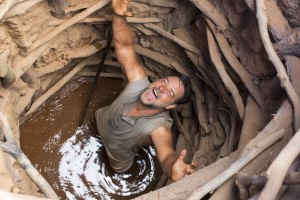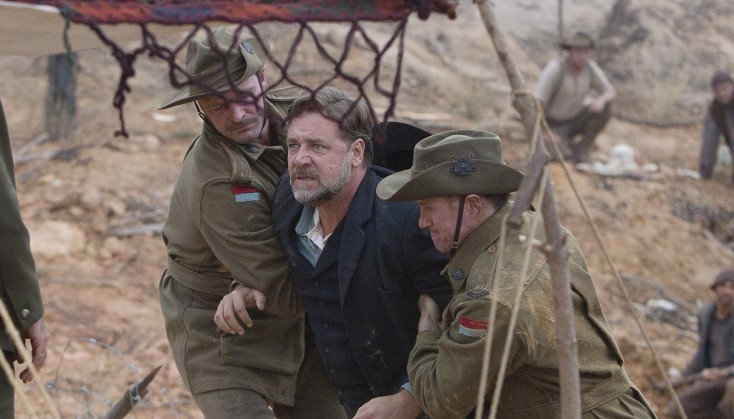
RUSSELL CROWE directs and stars as Joshua Connor in the drama “THE WATER DIVINER.” ©Warner Bros. Entertainment. CR: Mark Rogers.
By ANGELA DAWSON
Front Row Features
HOLLYWOOD—Russell Crowe arrives for an interview to promote his new film “The Water Diviner,” in which he not only stars but also makes his feature film directorial debut.
The proud owner of an Australian rugby team, he begins handing hats commemorating his team’s national championship to the journalists assembled. He’s obviously delighted in talking about his team’s victory and his new film, which already has opened in his home country and elsewhere, and is scheduled to open in North America Friday, April 24.
A fictional story about an Australian farmer who goes searching for his sons following the bloody Battle of Gallipoli in Turkey, “The Water Diviner” has earned kudos back home in Australia, where it has won three Australian Academy of Cinema and Television Arts Awards. The 51-year-old Academy Award winning actor says the story of a father’s love for his children, by writers Andrew Knight and Andrew Anastasios, spoke to him and made him want to direct it. The idea for the script came from one line in a letter an Australian military office sent to an Australian author about an old man from Australia trying to find his son’s grave in Turkey. There was no mention of an actual water diviner, although Anastasios’ grandfather purportedly could find water using metal rods, according to Crowe.
The film is not without controversy. Some have questioned the omission of any mention of the Armenian genocide, which took place in Turkey the same year as the Battle of Gallipoli, an event recreated in the film. A group has organized a protest and boycott of the film on social media, with more than 15,000 Likes on Facebook. The release date of the film coincides with the centennial commemoration of the Armenian genocide, in which an estimated 1-3 million Armenians (as well as Greeks and Assyrian Christians living in Turkey) were killed by the Turkish military. The Turkish government has never acknowledged that part of its history, although Pope Francis recently called on that country’s leader to do so. Crowe explains during an interview that the film is not about the genocide but about a farmer and his search for his missing sons.
Q: You appear to be happy about your team’s championship. Is that better than an Oscar to you?
Crowe: It’s a very deeply satisfying thing, because sport in Australia is so community-connected. We don’t have the thing with franchises like they do in America where they can move from city to city. Your geography is where you live. South Sydney, the district, which goes from the CBD to the airport and to the coast to the beaches below Bronte in Sydney, it has some of the most dense areas of government housing. It has the highest population of urbanized aboriginals, but it also has some of the most expensive real estate in the country. So it’s a very complex grouping of people. So to reconnect the club to the community and get all of those to those diverse people all facing in the same direction was a complicated and trying thing to push towards.
But bit by bit and gradually, everybody started to believe. And the benefit of this, which again is slightly difficult to explain the Americans, is yes, of course, my investment has exponentially increased with the success of the team, yes, so that on one hand, it is business, and there is an economy involved. But the reality is that because it’s so community-based, it’s my community penance to bring this team back to the level of winning championship.
In my district that I grew up in, it creates more doctors and lawyers, not more sportsmen necessarily. It creates more kids who will go out and fulfill their dreams because they have a nine-year shining example of just how tough it can be. But if you keep focused and concentrated, you will achieve your goal. That’s the great benefit of this. Sport for me is about inspiring kids. Here are the rules. Here is the play area. Sometimes you win. Sometimes you lose. This is all about teaching kids how to approach life. If we’re not playing sports to benefit kids, I’m not really sure why we play sport.
Q: That sports versus war was the idea behind the original Olympic Games, where enemies would kind of work out their differences on the field in sport rather than in battle.
Crowe: There was a journalist in Washington, D.C. that said, “Any war should start with one mother from one side and one mother from the other side. Let them have a conversation and see if we can just work stuff out before it even begins. Send out your best mom.” (He laughs.)
Q: When it comes to directing, one of your best directors is Ron Howard, who was an actor turned director, and you even worked with RZA on his directorial debut. So was directing something always on your radar, and did you have a background already in a transition or being able to do both at the same time?
Crowe: Yeah. I’ve been working in front of the camera since I was six years old. I’ve done 25 years now of lead roles in feature films. So that’s a massive accumulated direct onset experience level. The idea of directing as an intellectual concept has been there for a long period. Pushing towards that, I’ve shot maybe 30 video clips of bands under various names and three full-length documentaries. So I’ve been educating myself in the process and also preparing in terms of developing things and stuff. But this came out of the blue. This chose me rather than I chose it.
Q: How did this project come about?
Crowe: I was in the middle of the most busy professional year I’ve ever had. Between 2011 and 2012, I did five feature films: “Man of Steel,” “Broken City,” “Les Miserables,” “Noah” and “Winter’s Tale.” Normally, when you express interest in more than one thing, (projects) cannibalize themselves or they cannibalize each other and you get to do one thing. But somehow, five groups of producers managed to work it out, so I was essentially working continuously.
In the middle of that, this personal stuff happened, and it’s like my kids, there’s separation (from wife Danielle Spencer), there’s all of this stuff going on. And this script arrives and I read it and I have such a visceral connection to it and a cultural connection because the Battle of Gallipoli is a massive touchstone for Australians and New Zealanders and remains so today.
Q: What did you connect with?
Crowe: It’s a story of a man with three sons who go to war and don’t come back. I’m a father of two boys. Of course, that’s going to hit me at an essential level. There was an opportunity in the script to actually do what very few war films or films that touch on war do, and that was to show of balance that there’s going to be bravery and compassion and grief on both sides of any conflict. So it just hit me at such a deep level and for so many reasons that I found this voice coming out of me that I’ve never actually heard before, and probably the thing that I’ve been waiting for where I was saying that I have to take responsibility for this story.
This voice was coming out at me that hadn’t been there before, and so I knew that all that accumulated experience and intellectual concepts aside, I was ready.
Q: This is obviously not a documentary, so you’re allowed some creative license in telling your story, but there isn’t any mention of the genocide in the film. Why?
Crowe: How do you possibly connect the two things? How do you connect a man who has come from Australia, gone to the battlefield of Gallipoli to what you’re talking about? How do you connect it geographically? How do you connect it in any way? It doesn’t connect. This is a story about an Australian man who travels to Turkey at a certain time and has X experiences, none of which crosses over to what you’re talking about. In this particular area of the world, it’s very complicated at this stage. So there could be another thousand feature films made about things that were happening roughly around this broader geography and in this broader time period that has nothing to do with what you’re talking about.
Q: Can you talk about what the appeal of your role was to you and what you brought to this project?
Crowe: Going back to that historical accuracy thing, you have to be very careful to understand that a lot of people put a massive amount of effort into bringing this movie to life and telling the story as accurately as they could—from the clothing, to the uniforms, to the weaponry, to the horses, all the way down to the saddles and the type of horseshoes and everything. So, for somebody for their own political reasons to denigrate that work is just not fair. As I’ve said, the complications of the world at that time, within that geography and nearby or on the other side of the world, there are many complications. But this story of a man who leaves Australia and goes to Turkey and has these particular experiences doesn’t cross over into what you’re talking about.
Q: Can you talk a little bit about the whole water diviner thing? Because I know you have a personal connection with that, that your dad was a water diviner?
Crowe: Well, he had never called himself that. In fact, when I started talking to people about it, he rang me and he said, “Listen, man, you got to stop telling people I’m a water diviner. I’ve never found a body of water in my life.” And I said, “Dad, in 1978, we were in Auckland (New Zealand) and we came out of the house on Quona Avenue. The council guys were on the street looking for a broken water pipe. You went inside, you got an old metal coat hanger, you undid it, you shaped it into a Y, you walked up and down the streets, stuck it in the grass and said, “The break is here.” We went off the sport, we came back three hours later, and that’s exactly where the council was digging. And my dad said, “Well, yeah, I can find a broken pipe.” So yeah, I knew it was the real thing because I’ve seen him do it.
(Also), Andrew Anastasios’ grandfather was quite a famous water diviner in Australia, and completely ironically and ridiculously coincidentally, one of the people he found water for was (actor/director) Mel Gibson. Mel Gibson had a property in Norlane, Victoria, and Andrew’s grandfather found him a water source so he could feed the stock. Mel is just crazy about that.





